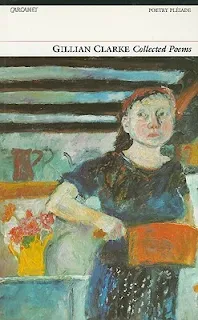This one comes from her Collected Poems (Carcanet Press, 2008). Here she makes a personal recollection, a true story after she was invited to read poetry to patients in the Occupational Therapy Department of a mental hospital in South Wales, organised to celebrate St Davids Day. The contrast between her opening quote and the rest of the poem, draws you in. Hers is set amongst enclosed walls, that are often closed to the outside world,that many people are unable to witness unless they have been unfortunate to have spent some time waiting for miracles, diving for stones,an almost invisible world that Gillian Clarke brings to life, providing a rare glimpse of an often private hidden world, while the Wordsworth (the opening quote) poem which she returns to, looks outside for inspiration. I think it has much power and depth, and I find it very moving. I hope you enjoy.
Miracle on St David's Day
They flash upon that inward eye
Which is the bliss of solitude
- The Daffodils - William Worsworth
An afternoon yellow and open-mouthed
with daffodils. The sun treads the path
among cedars and enormous oaks.
It might be a country house, guests strolling,
the rumps of gardeners between nursery shrubs.
I am reading poetry to the insane.
An old woman, interrupting, offers
as many buckets of coals as I need.
A beautiful chestnut-haired boy listens
entirely absorbed. A schizophrenic
on a good day, they tell me later.
In a cage of first March sun a woman
sits not listening, not seeing, not feeling.
In her neat clothes, the woman is absent.
A big mild man is tenderly led
to his chair. He has never spoken.
His labourer's hands of his knees, he rocks
gently to the rhythyms of the poems.
I read to their prescences, absences,
to the big, dumb labouring man as he rocks.
He is suddenly standing, silently,
huge and mild, but I feel afraid. Like slow
movement of spring water or the first bird
of the year in the breaking darkness,
the labourer's voice recites The Daffodils'.
The nurses are frozen, alert; the patients
seem to listen. He is hoarse but word-perfect.
Outside the daffodils are still as wax,
a thousand, ten thousand, their syllables
unspoken, their creams and yellows still.
Forty years ago, in a Valleys school,
the class recited poetry by rote.
Since the dumbness of misery fell
he has remembered there was a music
of speech and that once he had something to say.
When he's done, before the applause, we observe
the flowers' silence. A thrush sings
and the daffodils are aflame.
Reprinted from :-
Gillian Clarke:Collected Poems
Carcanet 1997
Originally from
'Letter from a far Country; 1982
Happy St Davids Day/
Dydd Gwyl Dewi
heddwch/peace


i don't understand it :s
ReplyDeletetry again.... look , it becomes clear...regards.
ReplyDeleteBANTER!!!!!!!!!!!!!!!!!!!!!!!!!!!!!!!!!!!!!!!!!!!!!!!!!!!!!!!!!!!!!!!!!!!!!!!!!!!!
ReplyDeleteOh well ... never mind eh....
ReplyDeleteThis is a wonderful poem which shows how the power of words can break through the misery of mind and heart. I love the way the poet describes the nurses as "frozen", they do not expect miracles and professionally, are at a loss, whereas the patients, frozen in their depression and other psychiatric conditions, begin to stir into life like the spring flowers outside ,as this big, dumb man not only speaks for the first time in years but recites a poem he learned as a child ,his memory awoken by the poet's own poetry reading. I love everything Gillian Clarke has written but this is one of my favourites.
ReplyDeleteThank you Sheila for eloquent thoughts. Regards... I believe Gillian Clarke's work contains much richness, that I personally feel I can understand..
ReplyDeleteYou're very welcome, I've been a fan of hers since the late 80's and what she wrote then still resonates with me.
ReplyDeleteClear memories of the Aberfan disaster and this poem reflects that beautifully. Thank you.
ReplyDeleteThank you Gillian. wonderful poem - memories of the Aberfan disaster
ReplyDeletethank you kindly for your comments, yes a wonderful evocative poem. Regards.
ReplyDeleteGreat poem!
DeleteNice poem!
ReplyDeleteSuch a moving poem... The Gillian Clarke poem which has the most profound effect on me is 'Neighbours', which tells the reader of the widespread consequences of the Chernobyl disaster. I recall taking my daughter, my firstborn child, in her pram along the prom in Aberystwyth and the rain starting to fall as I walked. That evening the news was of radioactive rainfall and the discovery of its source...Eleven years later, I had two children who lived in the vicinity of Chernobyl to stay with me for a couple of weeks respite. Very best wishes to you, Dave, from Stephanie Burgess.
ReplyDeletethank you kindly for your comment, most interesting, all the very best.
ReplyDelete